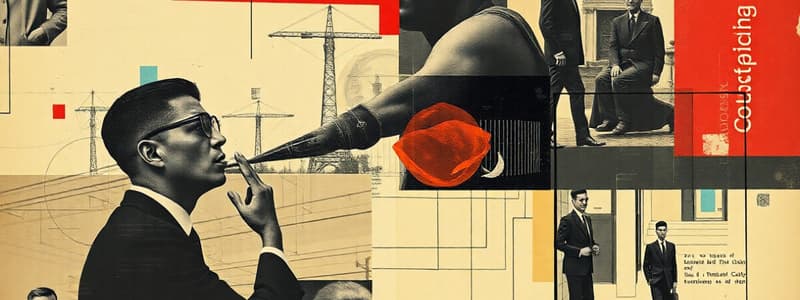Podcast
Questions and Answers
What is included in the supervisory responsibility of a job description?
What is included in the supervisory responsibility of a job description?
- Authority to make hiring decisions (correct)
- Setting employee salaries
- The ability to train employees
- Monitoring employee attendance
Which of the following best describes job enlargement?
Which of the following best describes job enlargement?
- Adding managerial responsibilities
- Promoting employees to higher positions
- Increasing the number of tasks in a job (correct)
- Reducing the number of tasks in a job
What distinguishes job enrichment from job enlargement?
What distinguishes job enrichment from job enlargement?
- Job enlargement encourages challenging tasks; job enrichment involves administrative duties.
- Job enrichment increases task number; job enlargement focuses on skill development.
- Job enrichment requires more skill and offers higher pay; job enlargement does not. (correct)
- Job enrichment simplifies tasks; job enlargement complicates them.
In the essential functions section of a job description, what is the primary focus?
In the essential functions section of a job description, what is the primary focus?
What is typically included in the qualifications section of a job description?
What is typically included in the qualifications section of a job description?
What is a major benefit of job enlargement?
What is a major benefit of job enlargement?
How does the working conditions section of a job description benefit applicants?
How does the working conditions section of a job description benefit applicants?
What is the purpose of non-essential functions in a job description?
What is the purpose of non-essential functions in a job description?
What is the primary goal of job analysis?
What is the primary goal of job analysis?
Which of the following is NOT a step in conducting a job analysis?
Which of the following is NOT a step in conducting a job analysis?
What method is NOT typically used in job analysis?
What method is NOT typically used in job analysis?
Which of the following is a purpose of job analysis in Human Resource Management?
Which of the following is a purpose of job analysis in Human Resource Management?
What type of information is necessary to include in a job analysis process?
What type of information is necessary to include in a job analysis process?
Which of the following describes a job description?
Which of the following describes a job description?
Which of the following is included in the assessment process during job analysis?
Which of the following is included in the assessment process during job analysis?
What should be gathered from the job holders' supervisors during a job analysis?
What should be gathered from the job holders' supervisors during a job analysis?
What is included in the psychological characteristics of a job specification?
What is included in the psychological characteristics of a job specification?
Which of the following is NOT a part of physical characteristics in job specification?
Which of the following is NOT a part of physical characteristics in job specification?
How does job specification contribute to training and development?
How does job specification contribute to training and development?
Which characteristic is part of personnel characteristics?
Which characteristic is part of personnel characteristics?
What does dejobbing primarily involve?
What does dejobbing primarily involve?
What is a demographic characteristic mentioned in job specification?
What is a demographic characteristic mentioned in job specification?
Which of these responsibilities involves supervision of others?
Which of these responsibilities involves supervision of others?
What primary role does job specification play in recruitment?
What primary role does job specification play in recruitment?
What is a primary reason companies are relocating their businesses to other countries?
What is a primary reason companies are relocating their businesses to other countries?
What is a consequence of economic instability for companies?
What is a consequence of economic instability for companies?
Which generation is primarily mentioned as impacting current workforce dynamics?
Which generation is primarily mentioned as impacting current workforce dynamics?
What is a characteristic of flatter organizations?
What is a characteristic of flatter organizations?
Which of the following best describes a boundaryless organization?
Which of the following best describes a boundaryless organization?
What does re-engineering primarily involve?
What does re-engineering primarily involve?
What does personnel planning specifically address?
What does personnel planning specifically address?
Which of the following is a characteristic of a dejobbed organization?
Which of the following is a characteristic of a dejobbed organization?
What is the main purpose of forecasting personnel needs?
What is the main purpose of forecasting personnel needs?
Which factor is NOT typically used in forecasting staffing needs?
Which factor is NOT typically used in forecasting staffing needs?
How can an organization prevent falling behind on order fulfillment?
How can an organization prevent falling behind on order fulfillment?
What aspect of HR planning helps avoid staffing shortages caused by employee departures?
What aspect of HR planning helps avoid staffing shortages caused by employee departures?
How does human resources forecasting assist in budgeting?
How does human resources forecasting assist in budgeting?
Which of the following is NOT a characteristic of true HR planning?
Which of the following is NOT a characteristic of true HR planning?
Which benefit does effective HR planning NOT provide to businesses?
Which benefit does effective HR planning NOT provide to businesses?
What is a common misconception about having an HR manager in place?
What is a common misconception about having an HR manager in place?
Flashcards are hidden until you start studying
Study Notes
Job Analysis
- A systematic process used to identify the tasks, duties, responsibilities, and working conditions associated with a job
- Includes the knowledge, skills, abilities, and other characteristics required to perform that job.
- Includes information:
- Competencies needed to be assessed
- Examples of behaviors that clarify the competencies
- Suggestions as to the types of exercises that resemble job situations
- Suggestions for problem content to be used in the exercises
- Indication of the level proficiency required for the competencies
- Standards for scoring applicant performance in the exercises
- Documentation Job-relatedness of the assessment process
- Job analysis steps:
- Plan the process, resources, and time frame
- Gather and analyze current information about the job: job descriptions, ads, training materials, performance plans
- Choose a representative sample of job holders
- Gather demographic data on the job holders
- Gather information from the job holders’ supervisors
- Gather information from the senior managers
- Establish a preliminary list of job competencies and skills
- Obtain ratings of the importance of the job skills and competencies
- Job analysis methods:
- Interviews
- Questionnaires
- Observations
- Main purposes of job analysis in HRM:
- Job designing and redesigning
- Human resource recruitment and selection
- Determining training needs
- Establishing a compensation management policy
- Conducting performance reviews
Job Description
- An internal document that clearly states the essential job requirements, job duties, job responsibilities, and skills required to perform a specific role.
- Format:
- Title
- Supervisory Responsibility
- Contacts
- Position Objective/Job Summary
- Essential Functions
- Non-Essential Functions
- Working Conditions
- Qualifications
- Education
- Experience
- Required Skills
Job Specification
- A detailed description of the role, including all responsibilities, objectives, and requirements
- Outlines specific traits a person needs to do the job
- Characteristics:
- Physical Characteristics
- Psychological Characteristics
- Personnel Characteristics
- Responsibilities
- Demographic Characteristics
- Various significance of Job Specification:
- Preparation of Employee Specification
- Training and Development
- Recruitment and Selection
Job Enlargement
- An increase in the number of tasks associated with a certain job
- Increasing the scope of one’s duties and responsibilities
- Also known as horizontal loading
- Major Benefits:
- Reduced Monotony
- Increased Work Flexibility
- No Skills Training Required
Job Enrichment
- A method of motivating employees where a job is designed to have interesting and challenging tasks which can require more skill and can increase pay.
Dejobbing
- When an organization or industry shifts away from formal job descriptions to some other arrangement to get their work done.
- Reasons for Dejobbing:
- Technology
- Globalization
- Economic Instability
- Changing Employee’s Perspective
- Techniques of Dejobbing:
- Flatter Organizations
- Work Teams
- Boundaryless Organization
- Re-Engineering
- Characteristics of a Dejobbed Organization:
- Broad, Generalized and Market-driven jobs
- Multi-skill and Multi-tasking training
- Working beyond Job descriptions
- Ever-changing and brief character of Jobs
- Flexible Workforce
- Cross-functional assignment
- Temporary and Autonomous groups
Personnel Planning and Recruiting
- Personnel planning is the process of determining an organization’s human resource needs.
- Workforce planning is the process of deciding what positions the firm will have to fill, and how to fill them.
- Forecasting Personnel Needs involves projecting labor needs and the effects they’ll have on a business.
- Using an Organization Chart helps you hire proactively and avoid ending up with employees who don’t fit into your future organization.
- Production and Scheduling - If you make a product, your labor needs change as sales rise and fall.
- Budgeting Based on Future Staffing Levels - Human resources forecasting helps you plan budgets based on your future staffing levels.
- HR Planning Versus Management - There is a distinction between HR planning and HR management. HR management includes day-to-day tasks such as hiring, orienting workers, handling payroll, managing grievances, setting schedules, conducting reviews, and terminating employees. True HR planning includes creating a multi-year path for staffing, evaluating the cost-effectiveness of using contractors versus employees, identifying potential training plans, creating a company policies and procedures manual, and determining how and when to offer benefits.
Studying That Suits You
Use AI to generate personalized quizzes and flashcards to suit your learning preferences.





